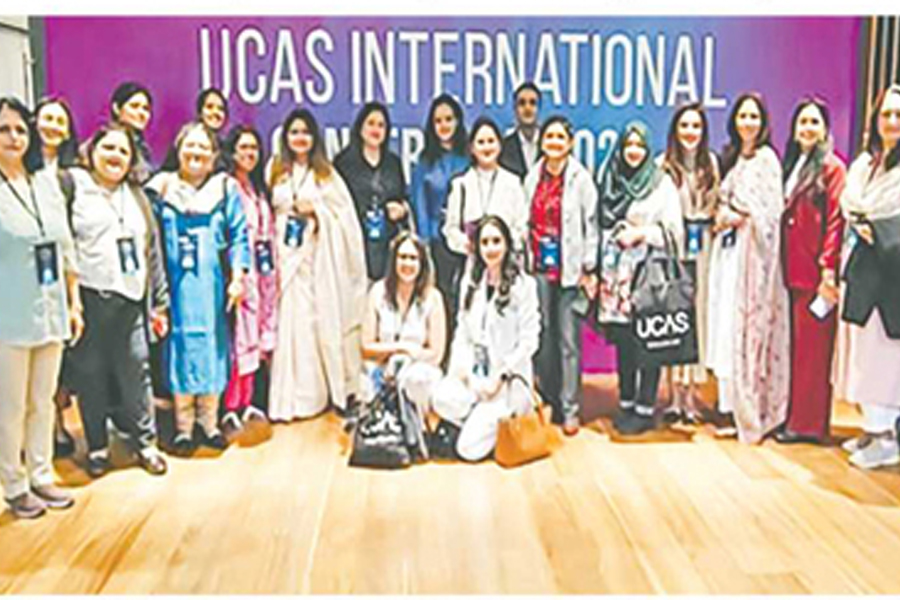
Published :
Updated :

My journey as a counsellor began in the UK, where I studied law. During this time, opportunities arose to assist international students with academic guidance, sparking a deeper interest in counselling. With over 10 years of experience in career planning and education support, now I have grown into a professional in this field. Initially, counselling wasn't my primary focus, but I discovered my natural ability to guide students in their educational journeys. For the past eight years, I have served as a full-time career guidance counsellor at Scholastica, working at both senior campuses, and I currently serve at the senior campus at Mirpur.
A formal association with the British Council was established two years ago, building upon prior collaborations between the organisation and Scholastica. Recently, the British Council reached out to strengthen connections with counsellors, inviting us to events like the Agent-Counsellor training and the UCAS International Conference, where we networked with university representatives and other school counsellors.
Driven by a thirst for knowledge, I embarked on the Counsellor Accreditation Programme (THE CAP) in 2024, earning my accreditation as a counsellor under the auspices of Times Higher Education, BMI, and Common Purpose/Evolve Career. I have also attended prestigious global conferences such as the UCAS International Conference 2024 in the UK, where I was selected by the British Council, Bangladesh, the Global University Counsellor Connect 2023 in Singapore, the g2 Global ED Gathering 2023, and the IC3 Annual Conference 2022 in India. In addition to these enriching experiences, I hosted the IC3 Regional Forum in Dhaka in 2024 and actively participated in various regional forums across Bangladesh. My dedication to continuous learning is reflected in extensive training and workshops at universities worldwide, enhancing my expertise in university applications and strengthening my role as a trusted expert in the field.
After returning to Dhaka from the UK, I had the opportunity to intern at the Dhaka Judge Court, where I gained valuable insights into the legal field. During this time, I also explored my passion for education, which opened my eyes to new possibilities. This exploration inspired me to join a Canadian agency, where I further developed my interests. Ultimately, this journey led me to my current role at Scholastica, where I am thrilled to contribute to the world of learning and development.
Though my legal background initially focused on assisting people with legal matters, I came to appreciate the significance of guiding individuals in shaping their futures through education. This unexpected transition to educational counselling has brought immense fulfilment. Education is the backbone of a nation, and helping individuals navigate their educational paths empowers them to live with purpose and confidence.
Career counselling is not merely about providing information; it is about aligning aspirations with realistic opportunities while managing expectations effectively. As counsellors, we help students throughout the application process, from searching for suitable universities and scholarship opportunities to selecting the right career paths. One of the biggest challenges we face is balancing the expectations of students and their parents. Many students desire careers in fields like the arts, while parents often push for more traditional professions like medicine. Financial constraints also present challenges, particularly when talented students need more scholarships for studying abroad. While merit remains the cornerstone of higher education access, economic barriers continue to limit opportunities, necessitating stronger advocacy for scholarship expansion and financial aid accessibility. Additionally, there is a significant shortage of resources and training for counsellors, making accessing relevant materials or attending professional development opportunities difficult. If I were asked about building a robust career as a counsellor, I would say that continuous learning, strong networking, and a deep understanding of student needs are essential.
Conferences and workshops provide invaluable resources for counsellors to enhance their skills and offer first-hand experience with universities, which is crucial for advising students effectively. Organisations like the British Council, Education USA, and foreign universities host workshops tailored for counsellors. Still, these opportunities must be expanded to reach more counsellors, especially those in schools with limited resources.
The British Council has played an instrumental role in this field. The British Council has successfully engaged with school counsellors to strengthen connections and educate them about studying in the UK. Through meticulously designed training programmes, complete with prestigious certifications, they ensure counsellors remain at the forefront of global education trends. Their unwavering commitment is reflected in seamless communication via email and WhatsApp, keeping counsellors well-informed and engaged. Additionally, by organising insightful events, they play a pivotal role in helping counsellors distinguish between reputable and fraudulent agencies, ensuring that students receive ethical, high-quality guidance for their academic aspirations.
A holistic approach to education counselling requires an ecosystem where stakeholders collaborate to provide students with both guidance and financial support. A collaboration between government, non-government, and private organisations is essential for strengthening support for students seeking higher education. The government can play a significant role by reforming the curriculum, providing adequate funding for the education sector, and ensuring that schools have trained counsellors who can guide students on higher education opportunities. NGOs can bridge information gaps, especially in rural areas, by organising workshops and disseminating information about study-abroad opportunities. Investment in counsellor training programmes and resource accessibility can create a ripple effect, ensuring that quality guidance reaches students across socioeconomic backgrounds. Private organisations can enhance counselling services by offering specialised programmes or sponsoring educational seminars. A concerted effort by all stakeholders will not only empower counsellors with the necessary tools but also transform the higher education landscape in Bangladesh-ensuring that students, regardless of background, have equitable access to quality guidance, global opportunities, and a future driven by informed choices.
The writer is a career guidance counselor


 For all latest news, follow The Financial Express Google News channel.
For all latest news, follow The Financial Express Google News channel.